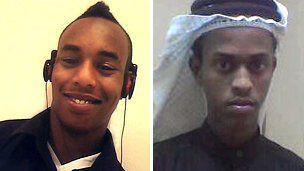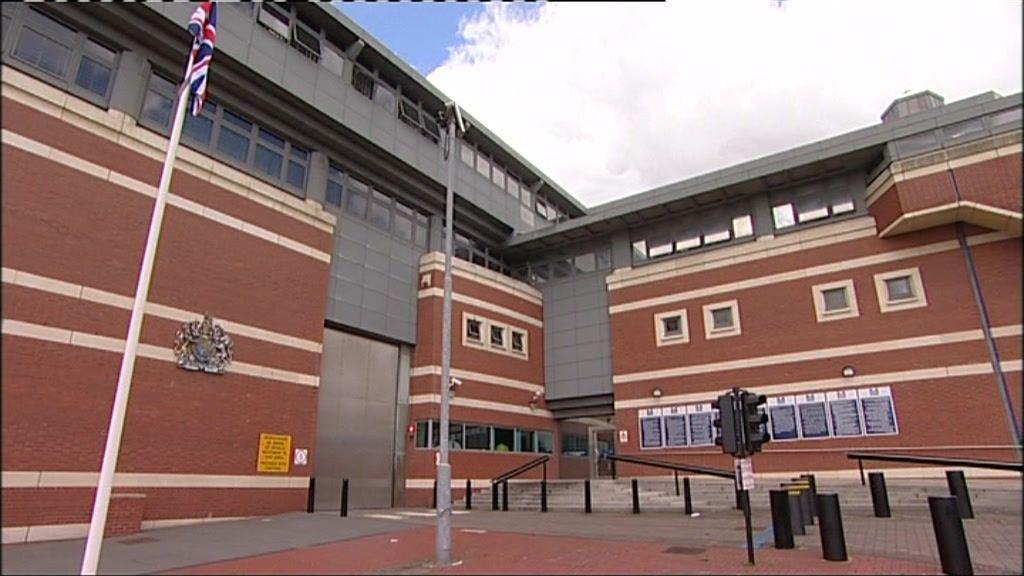Double killer wins compensation for solitary confinement

Fuad Awale, pictured in 2011, said he suffered "severe depression" after being denied association with other prisoners
- Published
A double murderer who also held a prison officer hostage has been awarded compensation after suffering "severe depression" when he was denied contact with other inmates.
Fuad Awale is serving a life sentence for shooting two men in the head in 2011 in what a judge described as a planned "execution".
Awale had been transferred to a special unit for the UK's most dangerous prisoners in 2013 after he and another inmate ambushed the officer and threatened to kill him.
However, a court heard he experienced mental health issues after being denied association with other inmates in the unit, partly due to risks reportedly posed by the so-called Death Before Dishonour anti-Muslim prison gang.
Awale, from Milton Keynes, claimed the gang stopped him from associating with other inmates in HMP Manchester and other prisons.
In a judgment from the High Court, judge Mrs Justice Ellenbogan concluded that Awale's rights under Article 8 of the European Convention on Human Rights had been breached.
"The degree of interference with the claimant's private life which has resulted from his removal from association has been of some significance and duration," she wrote.
Awale, then 25, was sentenced to a minimum of 38 years in January 2013 after shooting Abdi Farah, 19, and Amin Ahmed Ismail, 18, in an alleyway in Milton Keynes over a drugs dispute.
Extremist beliefs
The court heard Awale was also assessed to "hold extremist beliefs" following the 2013 hostage attempt, in which demands were made to release the radical cleric Abu Qatada.
At one stage, Awale requested to be allowed to associate with one of the killers of Fusilier Lee Rigby, the Manchester soldier murdered in 2013 by Islamic extremists Michael Adebolajo and Michael Adebowale in Woolwich.
That request was denied owing to "counter-terrorism concerns", the court heard.
However Awale's lawyers argued he had been classed as suitable for association with other prisoners within the tightly controlled units known as the Close Supervision Centre - which consists of 68 places across the UK's prison estate.
For several years he was able to mix with several other pre-assessed prisoners and attend Friday Prayers, until a fight among the group meant it was disbanded.
Awale was told he could join another association group with a prisoner referred to as GV - however the court heard that man was a member of Death Before Dishonour and had attacked Muslims before.

Mohammed Abdi Farah and Amin Ahmed Ismail were shot in an alleyway
In October 2019, Awale was moved to HMP Manchester and was told he would be able to associate with two other prisoners in the supervision centre area.
However after his arrival, he was told the men "posed a threat to him" and there were no prisoners suitable for him to associate with in that unit.
He told the court he later heard the men were also members of the Death Before Dishonour gang - which the court heard are dedicated to the "eradication of Muslims from the prison system".
Awale remained in Manchester throughout 2020 and initially "engaged with staff", but that relationship deteriorated due to what Awale described as his "depressed state".
In January 2021, Awale punched a prison officer in the face - a strike he claimed he made in "self-defence" - and a series of moves across the prison estate began.
Awale has been held in HMP Woodhill in Milton Keynes since 2021 and had not associated with any other prisoners since 17 March, 2023.

Fuad Awale punched a prison officer in the face at HMP Manchester
His lawyers argued the decisions to deny association were "opaque", that he had been denied the chance to argue his case and prison managers had failed to regularly review his segregated conditions as required by law.
Awale also argued that the Secretary of State for Justice had failed to take into account the high numbers of racist and Islamophobic prisoners in the supervision centre, making it difficult to find suitable groups for him to associate with.
Justice Ellenbogan allowed the claim on all grounds.
The court ruled that Awale would be entitled to non-pecuniary damages at an amount to be determined later.
The Ministry of Justice said: "We acknowledge the court’s judgement and will carefully consider the findings."
Listen to the best of BBC Radio Manchester on Sounds and follow BBC Manchester on Facebook, external, X, external, and Instagram, external. You can also send story ideas to northwest.newsonline@bbc.co.uk, external
Related topics
- Published10 January 2013